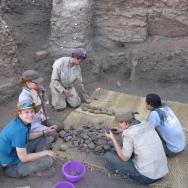The archaeological excavation of an ancient Egyptian city at Tell Edfu in southern Egypt, led by the Oriental Institute of the University of Chicago, has discovered well-preserved settlement remains dating to an important turning point in ancient Egyptian history, when the pharaohs began to renew interest in the provincial regions in the far south of their kingdom.
The dig revealed two large buildings that mark the earliest occupation uncovered so far in this part of the town, dating to about 2400-2350 BCE in the late Fifth Dynasty of Egypt. Ancient Egyptians made beer and bread andbosmelted copper in the complex, which was likely built to accommodate important officials sent from the royal capital in Memphis to oversee expeditions to mine precious metals and stones from the surrounding deserts.
“It’s a wonderful find because we have so little information about this era of settlement in the southern provinces,” said Nadine Moeller, associate professor of Egyptian archaeology, who leads the excavation together with Oriental Institute research associate Gregory Marouard. “We don’t know any such similar complex for the Old Kingdom.”
The Oriental Institute team has been excavating Tell Edfu, an ancient city located in the Nile Valley about 400 miles south of Cairo, for more than 16 years. In that time, they’ve worked backward through time to finally reveal the earliest parts of the settlement at the site.
Last December, they unearthed two large mudbrick buildings that appear to be centers for official administration. They are surrounded by vast open courtyards and workshops, where the excavation uncovered storage containers and other artifacts that suggest manufacturing activities such as bread and beer-making, as well as copper slag, pieces of crucibles, small weights and other evidence of metallurgy.
Inside the complex, in rooms and pits dug into the courtyard floors, they uncovered more than 200 broken clay sealings. These once served as official sealing stamps on boxes, bags and ceramic storage containers, as well as sealed papyrus letters. Many of these clay sealings carry hieroglyph names and titles of high officials, including an official who was the leader of the sementiu, a group of royal prospectors who carried out mining missions for King Djedkare-Isesi.
These expeditions would have supplied metals for the king, the elites of his court and construction projects in the capital at Memphis. Red Sea shells and rare Nubian imported ceramics further confirm the link to royal expeditions into the Eastern Desert, the researchers said.
“It’s just about this time that the Egyptian royalty, until then focused on the northern area directly around the capital Memphis, began to expand its reach after a period of contraction during the fourth and much of the fifth dynasties,” Moeller said. “This is a first sign that the ancient city of Edfu was evolving into an important departure point for large expeditions leaving for the Eastern desert regions, and possibly the Red Sea shore, located about 125 miles to the east.”
A number of oddities puzzled the archaeologists. The largest building has outer façades with a very distinct slope. “It’s very well-constructed and so the slope is certainly intentional, which highlights the architectural peculiarity of this monument,” Marouard said. “We don’t know of any other structure within an urban context in Egypt that looks like this.”
Additionally, even after the complex was abandoned, the massive, eight-foot-thick walls were never stripped and recycled for new buildings, as was the general practice. Even the entrance is perfectly preserved with the wooden door still in place—in a country where wood is rare and expensive.
Given that the buildings were set so close to the temple—about 20 yards—it’s possible they had religious or cult ties, the researchers said.
“It’s such a unique site. We’ve had a hard time finding architectural parallels, because no other settlement in Upper Egypt has such extensive remains from this time period,” Moeller said. “We’ve learned so much at Tell Edfu, and there’s still more to come.”
More than a dozen UChicago students have worked on the Tell Edfu excavation since it began, Moeller said. Current UChicago students include Emilie Sarrazin, Oren Siegel and Sasha Rohret.
